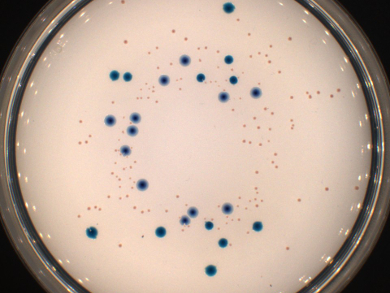Rising temperatures of the seas due to global warming can promote the growth of some pathogenic bacteria. The bacterium Vibrio vulnificus, for example, has led to cases of disease around the Baltic sea during heatwaves. An additional problem is the growing amount of microplastic particles in the oceans. These particles can harbor bacteria-containing biofilms on their surface.
Inga V. Kirstein, Alfred-Wegener-Institute, Helmholtz-Center for Polar and Marine Research, Helgoland, Germany, and colleagues have found potentially pathogenic Vibrio bacteria species on microplastics in the oceans for the first time. The team took water samples from 62 locations in the North and Baltic Seas and investigated the plastic microparticles found in the samples. On 19 of 135 particles, evidence of Vibrio bacteria could be found (pictured). The bacteria were identified using matrix-assisted laser desorption/ionization time-of-flight mass spectrometry (MALDI-TOF MS).
According to the researchers, the results do not mean that the number of bacteria on the particles is larger than in the surrounding water. The team aims to perform quantitative comparisons in the future.
- Dangerous hitchhikers? Evidence for potentially pathogenic Vibrio spp. on microplastic particles,
Inga V. Kirstein, Sidika Kirmizi, Antje Wichels, Alexa Garin-Fernandez, Rene Erler, Martin Löder, Gunnar Gerdts,
Mar. Environ. Res. 2016, 120, 1–8.
DOI: 10.1016/j.marenvres.2016.07.004
Also of Interest
- Plastic in Deep Seas,
Veronika Belusa,
ChemistryViews.org 19 May 2014.
Nearly all of Europe’s deep seas are polluted with litter, mainly with plastic




